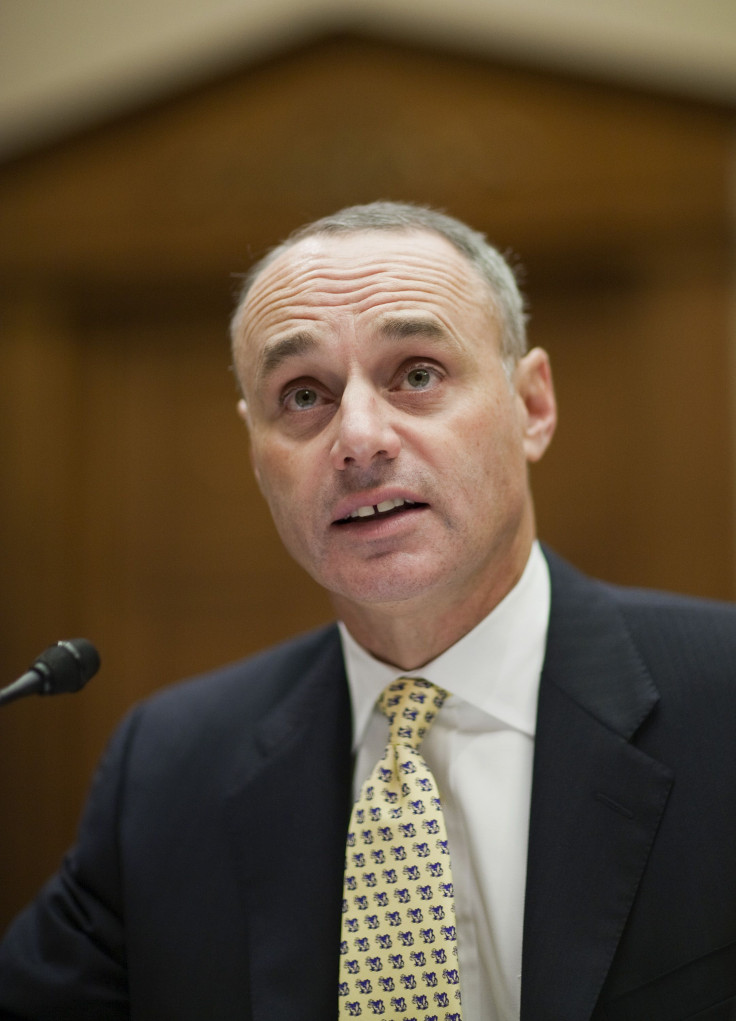New MLB Commissioner Faces Multiple Hurdles With Impending CBA

After garnering approval from at least 23 of Major League Baseball’s 30 owners, the league’s next commissioner will face a gauntlet of issues as Bud Selig’s successor. The league’s owners converged on a Hyatt Regency in Baltimore Wednesday, and are expected to hold a vote Thursday. With Selig, 80, expected to retire at the end of this season, the candidate list has been whittled down to Selig’s long-time deputy Rob Manfred and Boston Red Sox chairman Tom Werner, with owners reportedly concerned over sagging attendance numbers, how their slower-paced game can keep fans’ attention in the Internet age and the next round of labor negotiations with the players union. Seasoned league executive Tim Brosnan was the third candidate, but he pulled out of the running on Thursday afternoon before a vote was held.
Before and after the candidates gave their 50-minute long presentations Wednesday, Manfred was viewed as the heavy favorite after serving by Selig’s side for the better part of his 22-year reign. Manfred’s role during labor negotiations and avoiding a player strike since 1994 (something the NFL, NBA and NHL can’t say) is seen as his biggest claim to the commissioner’s office. Yet a small contingency of owners from both small and big markets, seemingly led by the Chicago White Sox Jerry Reinsdorf, are backing Werner, a hugely successful television producer who they believe has the skills necessary to draw fans back to the stadium. As the second half of the season began after the All-Star break, 17 MLB teams were experiencing a decline in attendance compared to last year, with the Philadelphia Phillies suffering an MLB-worst 21.39 percent drop off, according to Forbes.
However, the New York Times reports that Manfred’s backers don’t view Werner as a “savior” and think those supporting him have more of a personal axe to grind with Manfred. They also think he’s been too soft on the players union during labor negotiations.
MLB and the players union agreed to a five-year collective bargaining agreement that expires in 2016. The deal expanded the league’s drug testing program and created stricter suspensions for players who test positive for HGH and other performance-enhancing drugs. For instance, the first time a player tests positive for HGH they will serve an automatic 50-game suspension, and the number of offseason urine tests progressively increased from 125 to 250 before the start of the 2015 season.
But what really concerned owners, especially those in small markets, was the amount of money teams are allowed to spend on amateur draft picks, free agents and top international players. Thusly, the luxury tax threshold was also held at $178 million for the first two seasons of the deal, pressuring free spending clubs like the New York Yankees and Boston to keep their payrolls low, and it was only raised once to $189 million at the start of the 2014 season. Furthermore, the 15 teams from the largest markets won’t receive any revenue-sharing funds at the deal’s conclusion in 2016.
Those are a ton of restrictions that the big-market teams likely want scaled back, but it’s believed Manfred has already secured the minimum 23 votes needed to win. The Times said Manfred’s ascension to the top office is seen as a way to further cement Selig’s legacy. Selig has publicly said he is not supporting any of the candidates, though many think Manfred is his favorite. Manfred’s installation could also be a way for Selig to make sure Reinsdorf and other bottom-line oriented owners stay out of the commissioner’s office. According to Deadspin, much of the wrangling and political backstabbing around the election is due to a major conflict between Selig and Reinsdorf, the latter being one of the old guard owners who colluded to keep player salaries low in the 1980s, which many believe was the main cause of the 1994 strike. While most owners, big or small, would like to see salaries reduced and not have to fork over lengthy, $200 million contracts to growing stars like Los Angeles Angels outfielder Mike Trout, they certainly don’t want to see another work stoppage.
Furthermore, the owners and the new commissioner will find it difficult to make a case that they can’t afford to sign players to nine-figure contracts. While attendance fluctuates each year, every team in the league is benefiting from both their national and local TV rights deals. In 2012, MLB came to terms with FOX and TBS on a seven-year deal worth $12.4 billion that began this season and runs through 2021. That’s on top of the regional sports network, or RSN, contracts that teams like the Yankees and Los Angeles Dodgers have secured that pay them well upwards of $300 million per season, including an equity stake in the channel. And thanks to the revenue-sharing program, a smaller market team can still take in millions even if it doesn’t have a fan base as lucrative and sizeable like New York or Los Angeles.
© Copyright IBTimes 2024. All rights reserved.





















